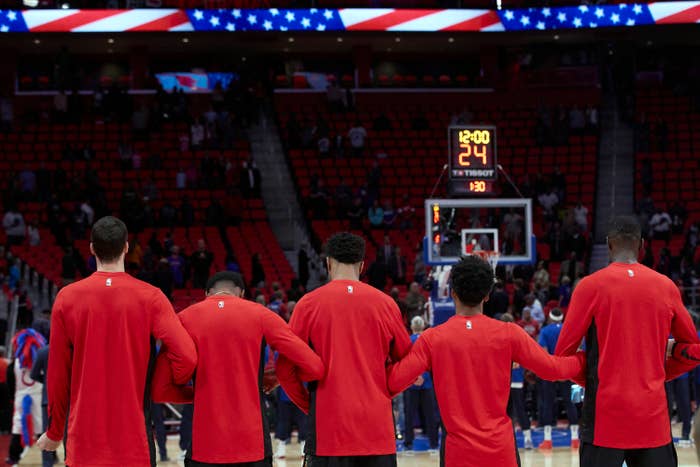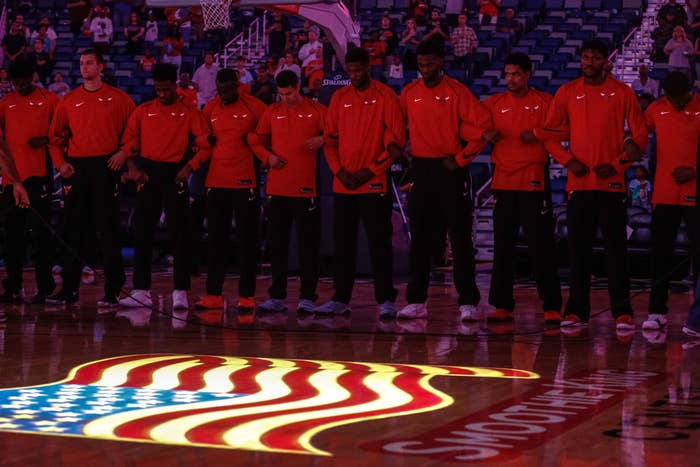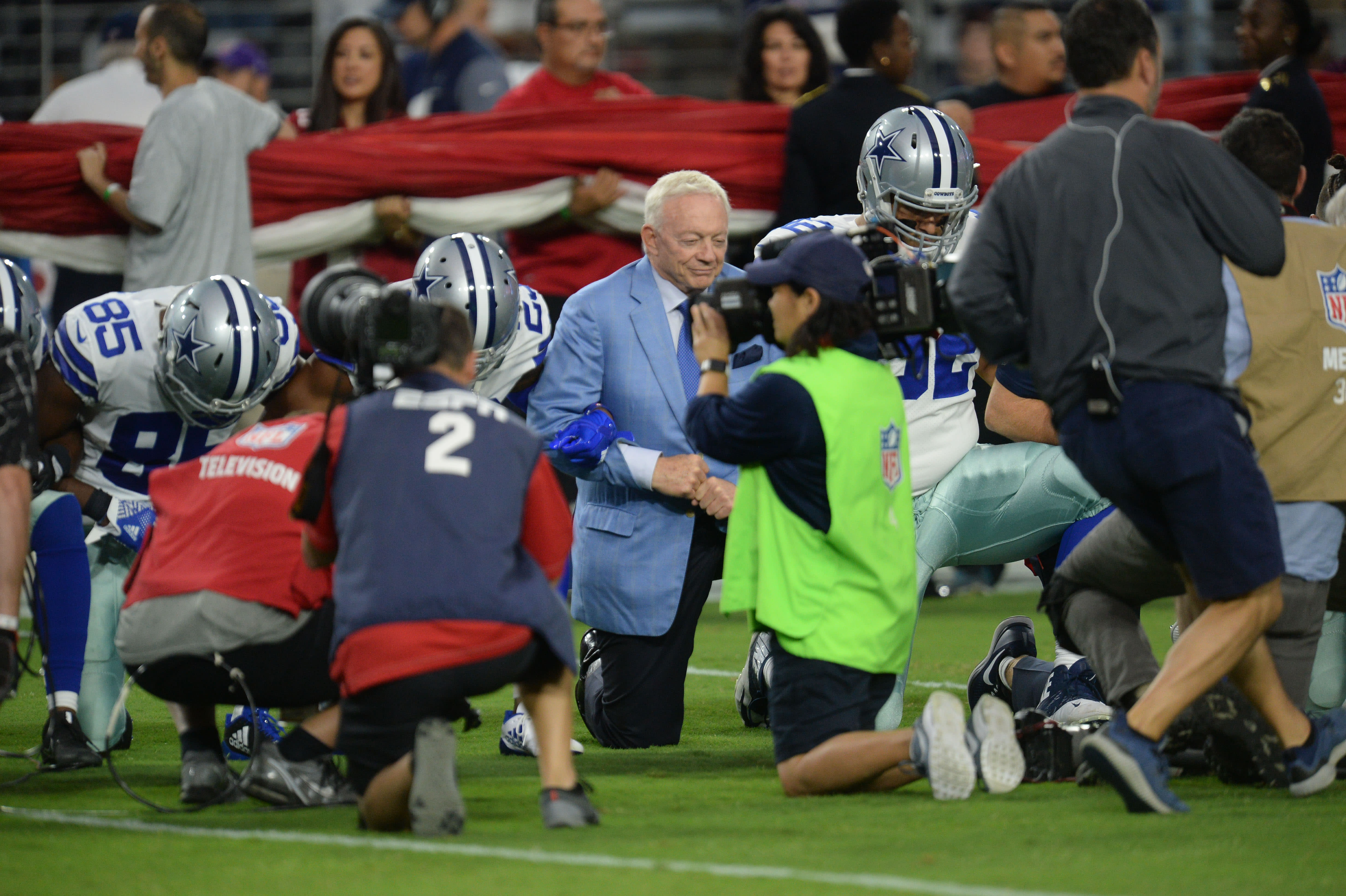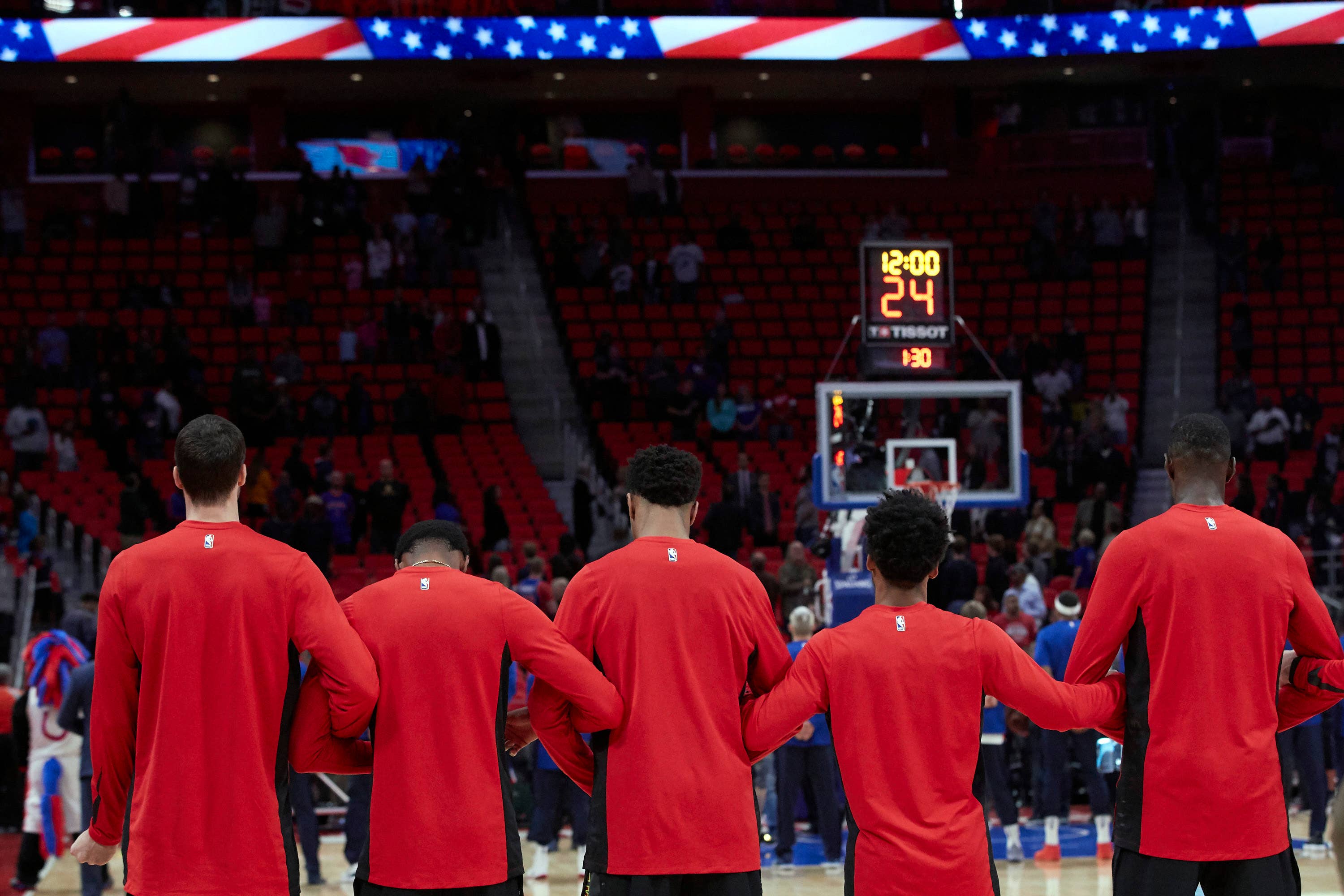
There’s a prevailing sentiment that the NBA is a radically enlightened sports league. Marquee players wore hoodies as a nod to Trayvon Martin and its biggest star called President Trump a “bum” with little to no blowback. Meanwhile, former San Francisco 49ers quarterback Colin Kaepernick remains unsigned, and theories about him being blackballed from the NFL because of his silent protest abound. The juxtaposition between the two leagues is magnified by the NBA’s celebration of Black History Month and Martin Luther King Jr. Day and the NFL’s ongoing struggles with dog whistle phrases like “run-first quarterback.” But the reality is that NBA ownership isn’t considerably more progressive or supportive of player activism than the NFL—it only looks that way.
All that forward thinking generally screeches to a halt when it comes to protecting the bottom line. And in the weeks leading up opening night, the NBA keeps publicly and privately reinforcing a rule that players are required to stand during the National Anthem. The most recent league memo took things a step further by noting discipline for violating the anthem rule would come directly from the league’s office as opposed to individual teams. The fact that these moves happened after Trump added some insults about Kaepernick and Stephen Curry to his ongoing occurrences of spewing presidential bile is particularly troubling
Consider NBA Commissioner Adam Silver’s milquetoast statement on Trump’s “invitation withdrawn” tweet to Curry. For those familiar with the delicate dance of corporate race relations, you could spot the proverbial jig from 94 feet away. By just about any objective measure, Curry is one of the NBA’s best players. He’s a four-time All Star who has been named to an All-NBA team each of the last four seasons. And yet, when Trump insulted Curry with his childish tweet, Silver wrote he was in favor of the Warriors visiting the White House to “share their views directly with the president” and was “disappointed” it wouldn’t happen. There was also some standard boilerplate about his pride in players’ community involvement but nothing in direct support of Curry.
Let’s briefly pretend Trump hasn’t turned similar White House opportunities to “share views” into empty photo opportunities with the likes of Kanye West, Steve Harvey, Jim Brown, and the heads of America’s Historically Black Colleges and Universities. There’s also the very chilling effect of when Craig Hodges attempted to share his views directly with President George H.W. Bush in 1992. Hodges wore a dashiki to the NBA Champion Chicago Bulls’ customary White House visit and presented Bush with a letter asking him to do more to end injustices facing the black community. Hodges never played another NBA game and unsuccessfully filed a lawsuit against the NBA and its owners for allegedly blackballing him.
“It’s well known through the league that there may be repercussions if you speak out too strongly on some sensitive issues,” then-New York Knicks forward Buck Williams told the New York Times. “I don’t know if Hodges lost his job because of it, but it is a burden when you carry the militant label he has.”
You don’t have to go all the way back to 1996, because one of the biggest flaws in viewing NBA ownership and Silver as “woke” came in 2014 with the league’s handling of former Los Angeles Clippers owner Donald Sterling. There’s a common, and false, assumption that Sterling had to cede control of a highly profitable team in the second-largest television market because he was recorded saying some racist remarks to his mistress. I’d argue that the NBA’s decision to issue a lifetime ban to Sterling in 2014 was a business move for optics.
The public outrage on Sterling’s KKK-inspired pillow talk to V. Stiviano was terrible for the league’s bottom line. One day prior to announcing Sterling’s lifetime ban, State Farm, CarMax, Virgin America, Kia, and Red Bull all suspended or severed their business relationships with the Clippers. If the NBA had such a low tolerance for racism, Sterling could’ve theoretically been banned years earlier under the same provision of the NBA Constitution that got him banned in 2014.

Former NBA Commissioner David Stern never fined nor publicly investigated Sterling despite the fact that Sterling found himself on the wrong end of a then-record $2.725 million discriminatory housing lawsuit from the Department of Justice. That suit claimed Sterling wouldn’t rent to Hispanic tenants because they “smoke, drink, and just hang around the building,” and similarly attempted to bar African-Americans from his properties because they “smell and attract vermin.” He settled the case without an admission of guilt.
Certainly the 2009 case, and similar claims by former Clippers general manager Elgin Baylor in a 2011 wrongful termination suit against Sterling fell under the NBA Constitution’s broad range of “misconduct of persons other than players” that eventually got Sterling banned. But that never happened, and the league seems to be taking a similarly troubling stance on the national anthem.
Opponents of Kaepernick’s brand of activism often point to his method of protest, seemingly showing more concern for the flag and its associated anthem than the humans engaged in the protest. They object to sitting, kneeling, or raising a fist during the singing of the national anthem. In this regard, they have something in common with the NBA in terms of trying to dictate how a player protests. By its very nature, dissent is disruptive. If people feel uncomfortable, a form of protest is likely working as designed. But the September 2016 memo signed by both Silver and NBA Players Union head Michele Roberts read like paternalistic instructions on how marginalized people should voice their concerns.
That memo touted the development of “substantive ways to come together and take meaningful action” with players and offered little else. How can any multibillion-dollar sports league judge what actions are meaningful and which ones are not? None of the league’s suggested methods, such as “community conversations in NBA markets,” addressed what is the largely legislative problem of the historical perception of sanctioned killings of unarmed, black citizens with no repercussions. The NBA doubled down with another “leaked” memo two weeks later reinforcing these suggestions, while Silver told reporters, “My expectation is that players will continue to stand.” These moves came off as either redundant or meant for another audience.

Sternly worded memos to players already bound by a collective bargaining agreement are one thing, but the NBA almost certainly has to work with unionized police to provide security to players and ticket buying customers at games. Silver and the NBA don’t need the drama of the false equivalence that was the Blue Lives Matter campaign. And they most certainly don’t want any part of what Cleveland Browns owner Jimmy Haslam faced when the Cleveland Police Union held a counter-protest against kneeling Browns players by refusing to participate in the pre-game flag holding ceremony. As such, more jarring forms of NBA player activism have drawn less of a cooperative response from Silver’s office. Silver didn’t fine players wearing Eric Garner-inspired “I Can’t Breathe” shirts during pregame warm ups, but said, “My preference would be for players to abide by our on-court attire rules.” The WNBA (owned by the NBA) also initially fined players wearing Black Lives Matter shirts highlighting the killings of Philando Castile and Alton Sterling last June before eventually rescinding the fines.
The NBA should be applauded for many things. The league boasts the first black coach in all of professional sports with Celtics’ great Bill Russell. The NBA also holds the distinction of employing the first celebrated, openly gay pro athlete in former Brooklyn Nets center Jason Collins. These are pioneering achievements the league uses to tout itself as an ally for marginalized groups.
Just because Curry and LeBron can clap back at Vladimir Putin’s pumpkin-colored puppet without harm doesn’t mean the NBA doesn’t have a long way to go. Spurs coach Gregg Popovich might be the most woke individual in American sports, but his boss, Spurs chairwoman Julianna Hawn Holt, still donated $5,400 to the Trump campaign in June and $250,000 to the Trump Victory Fund. Secretary of Education and noted Trump lackey Betsy DeVos, the champion of “free market education,” is a part owner of the Orlando Magic. A 2015 lawsuit the Department of Justice filed against Cleveland Cavaliers owner Dan Gilbert’s company Quicken Loans hints at Gilbert sharing some of the same questionable business practices as Trump. And the $750,000 Quicken contributed to Trump's inauguration in January of 2017 provides the type of financial link to Trump that Gilbert has recently tried to explain away after joining the Chicago Cubs during a White House visit in June. All of which is to say, if you’re boycotting the NFL because Kaepernick remains unemployed as owners sign far less proven players, there are just as many reasons to boycott the NBA.

